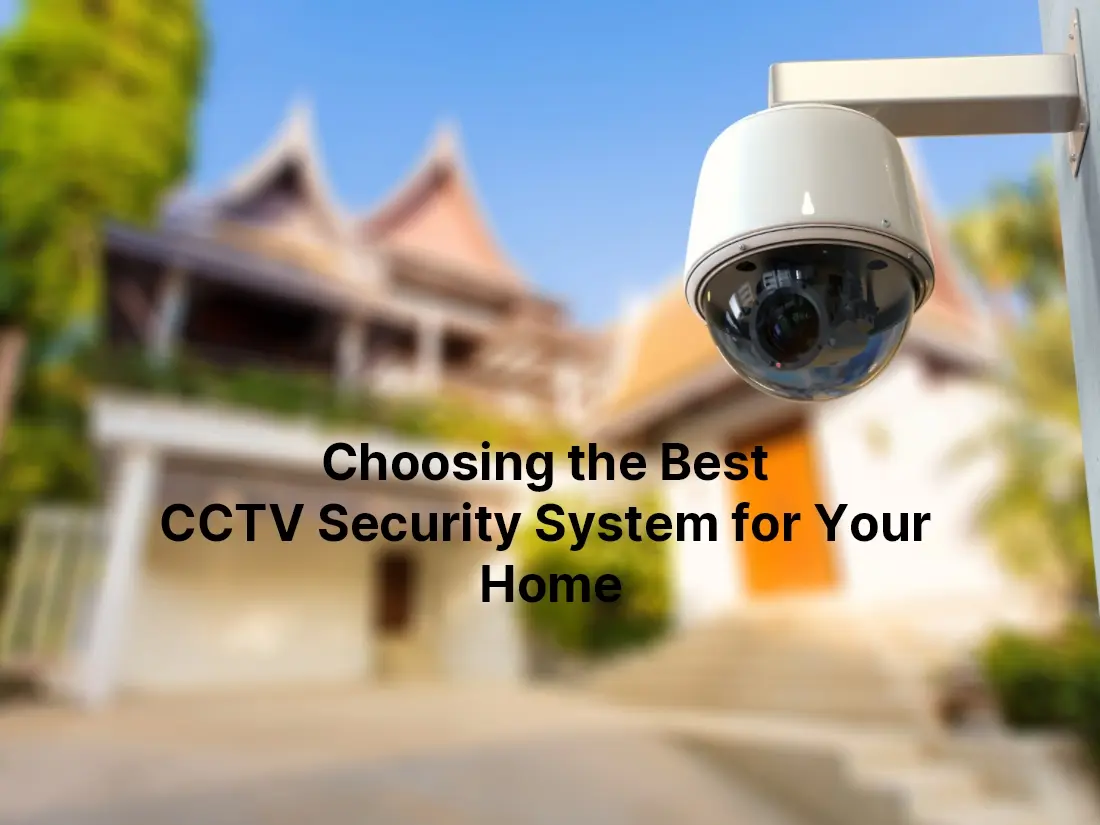
01 Jun Choosing the Best CCTV Security System for Your Home: A Comprehensive Guide
Your home is your sanctuary, and it’s important to make sure that it’s secure at all times. One of the most effective ways to do this is by installing a CCTV security system. With so many options available on the market, choosing the best one for your needs can be overwhelming. That’s where our comprehensive guide comes in. We’ve done the research and compiled everything you need to know about selecting the best CCTV security system for your home. From understanding the different types of cameras available to determining the right recording and storage options, we’ve got you covered. We’ll also provide you with tips on installation and maintenance to ensure that your CCTV security system stays in top working condition. So, whether you’re looking for a basic system or one with all the bells and whistles, this guide will help you make an informed decision and keep your home safe.
Why Do You Need a CCTV Security System for Your Home?
Home security is a top priority for homeowners, and CCTV security systems have become a popular choice recently. CCTV cameras provide a level of security and peace of mind that traditional security measures cannot match. With a CCTV security system, you can monitor your home and property 24/7, even when you’re not there. This means that you can keep an eye on your home, family, and pets, and be alerted to any potential threats before they become a problem.
CCTV security systems can also act as a deterrent to potential intruders. The presence of cameras can make criminals think twice before attempting to break into your home. If a crime does occur, CCTV footage can be used as evidence to help identify and prosecute the perpetrators. In addition to providing security, CCTV cameras can also be used for other purposes, such as monitoring children or elderly family members. They can also be used to keep an eye on pets, or to check on deliveries or service providers while you’re away from home.
Types of CCTV Security Systems
When it comes to choosing a CCTV security system for your home, there are several types to choose from. Each type has its advantages and disadvantages, and deciding the right one depends on your specific needs and budget.
One of the most common types of CCTV security systems is the analog system. Analog cameras are the traditional type of CCTV camera, and they transmit video signals via coaxial cables to a digital video recorder (DVR). Analog cameras are affordable and easy to install, but they have lower resolution and require more maintenance than other types of cameras.
Another type of CCTV security system is the IP system. IP cameras are digital cameras that transmit video signals over an internet protocol (IP) network. They offer higher resolution and better image quality than analog cameras, but they are pricier and require a reliable internet connection.
Wireless CCTV systems are also becoming increasingly popular. These systems use Wi-Fi or cellular networks to transmit video signals, eliminating the need for cables and making installation easier. However, they can be pricier and may be subject to interference or signal loss.
Do you need help choosing the right home CCTV security system?
Based on your budget and security plan, Downtown Computer Services will offer suggestions for selecting a CCTV security system. Call us at (954) 524-9002 right away, or request a consultation online.
Factors to Consider Before Choosing a CCTV Security System
Before you select a CCTV security system for your home, there are several factors that you should consider. These include your budget, the size, and layout of your home, and the level of security you require.
Your budget will play a major role in determining the type of CCTV security system you can afford. Analog systems are generally the most affordable, while IP and wireless systems tend to be pricier. The size and layout of your home will also affect your choice of CCTV security system. Larger homes may require more cameras and a more robust system to ensure full coverage. You should also consider the placement of cameras and the range of each camera when deciding your system.
The level of security you require will also influence your choice of CCTV security system. If you live in a high-crime area or have experienced security issues in the past, you may require a more advanced system with features such as motion detection, facial recognition, and remote access.
Understanding CCTV Camera Specifications
CCTV cameras come with a range of specifications that can be confusing to the average homeowner. Understanding these specifications is important when choosing the right CCTV security system for your home.
The resolution of a camera is one of the most important specifications to consider. Resolution refers to the number of pixels in the image, and higher resolution cameras offer better image quality. However, higher resolution cameras also require more storage space and can be pricier.
The field of view is another important specification to consider. This refers to the area that the camera can capture, and cameras with wider fields of view can monitor larger areas. The range of the camera is also important, as it determines how far the camera can see in low light conditions.
Other specifications to consider include the frame rate, which refers to the number of frames per second that the camera can capture, and the type of lens used in the camera. The type of lens can affect the clarity and distortion of the image.
Best Locations to Install CCTV Cameras in Your Home
Choosing the right locations to install your CCTV cameras is crucial for effective home security. The location of your cameras will depend on the layout of your home, the areas you want to monitor, and the type of CCTV security system you have.
The front and back doors are common entry points for intruders, so it’s important to have cameras positioned to monitor these areas. You should also consider placing cameras near windows, as these are also common entry points for burglars.
Other areas to consider for camera placement include the garage, the driveway, and any outdoor areas where valuable items are stored. You should also consider placing cameras in areas where children or elderly family members spend time, such as playrooms or bedrooms.
How to Install and Maintain Your CCTV Security System
Installing a CCTV security system can be a complex process, but with the right tools and knowledge, it can be done by most homeowners. Before installing your system, you should read the manufacturer’s instructions carefully and ensure that you have all the necessary equipment.
When installing your cameras, you should ensure that they are positioned correctly and that they are securely mounted. You should also test your cameras to ensure that they are capturing clear images.
Maintaining your CCTV security system is also important to ensure that it continues to function properly. Regular cleaning of the camera lenses and housings is important to prevent dirt and dust buildup, which can affect image quality. You should also check the cables and connections regularly to ensure that they are secure and functioning properly.
CCTV Security System Features to Look Out For
CCTV security systems come with a range of features that can enhance their effectiveness. Some features to look out for include motion detection, facial recognition, and remote access.
Motion detection can alert you to potential intruders and can also help to conserve storage space by only recording when motion is detected. Facial recognition allows you to identify specific individuals, which can be helpful in the event of a break-in or other security incident.
Remote access allows you to monitor your CCTV security system from anywhere, using a smartphone or other device. This can be particularly useful if you are away from home for an extended period of time.
CCTV Security System Cost and Budgeting
The cost of a CCTV security system can vary widely depending on the type of system you choose and the features it includes. Analog systems are generally the most affordable, with prices starting at around $100 per camera. IP and wireless systems tend to be pricier, with prices ranging from $200 to $500 per camera or more.
When budgeting for your CCTV security system, you should consider the cost of installation, as well as ongoing maintenance and monitoring fees. You should also factor in the cost of storage media, such as hard drives or cloud storage.
Top CCTV Security System Brands and Models
There are many brands and models of CCTV security systems on the market, but some are more popular and reliable than others. Some top brands and models to consider include Nest Cam, Arlo Pro, and Ring.
Nest Cam offers a range of indoor and outdoor cameras, with features such as motion detection and facial recognition. Arlo Pro cameras are wireless and weather-resistant, making them ideal for outdoor use. Ring cameras offer a range of features, including two-way audio and remote access.
Conclusion
Choosing the right CCTV security system for your home is an important decision that requires careful consideration. By understanding the different types of systems available, the factors to consider before making a purchase, and the features to look out for, you can make an informed decision and keep your home safe and secure. With proper installation and maintenance, your CCTV security system can provide you with peace of mind and protection for years to come. Downtown Computer Services can help you secure your home with a security system with 24/7 video surveillance and Wi-Fi HD cameras around the perimeter.
Call us at (954) 524 9002 right now or send us a request for a consultation.
Check out other relevant news
- How Easy-to-Use Hacking Tools Are Fueling Cybercrime
- Cryptocurrency Security for Small Businesses: Protecting Your Wallet
- The Infostealer Epidemic: Protecting Your Business from the Latest Wave of Cyberattacks
- The Identity Crisis: How Compromised Credentials Can Cripple Your Business
- Beyond the Brick and Mortar: Building Your Online Storefront with Digital Marketing
